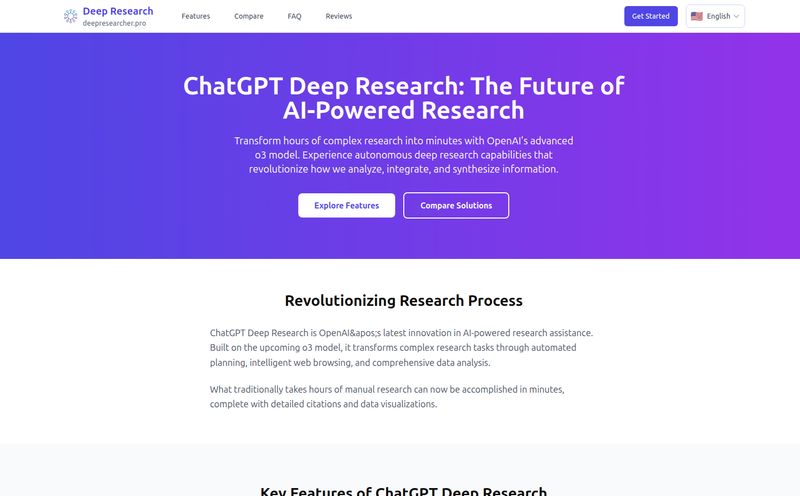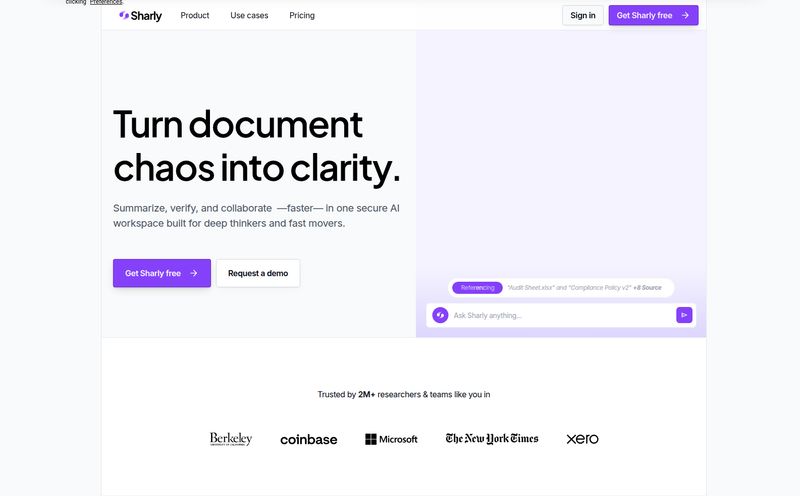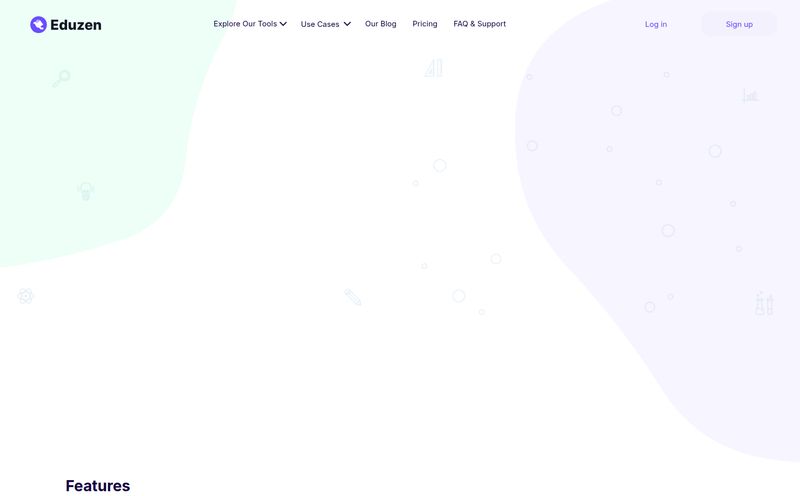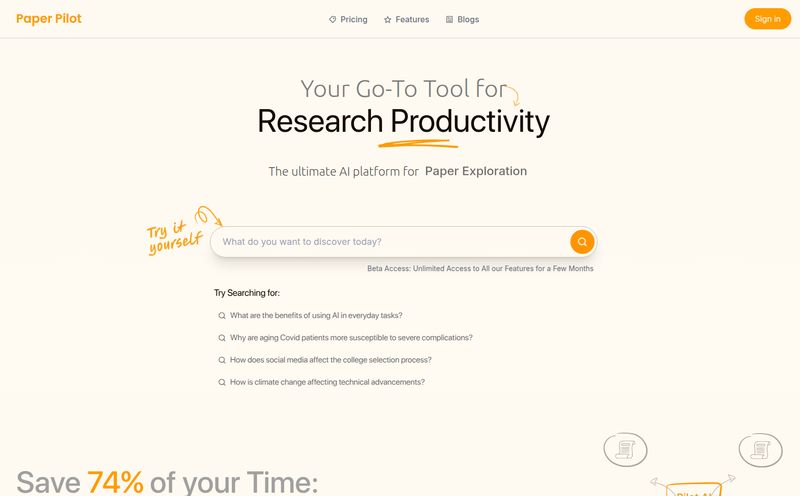My podcast queue is a monster. It’s an ever-growing, guilt-inducing list of 'must-listen' episodes from people like Tim Ferriss, Lex Fridman, and a dozen niche marketing shows. I tell myself I'll get to them on my commute, while doing dishes, during that mythical 'downtime' we all pretend to have. But who am I kidding? There are over 2 million podcasts out there. It’s a firehose of information, and we're all trying to drink from it with a teaspoon.
I’ve always felt this tension between the desire to learn and the sheer lack of hours in a day. You find a two-hour-long episode that promises gold, but you only have 20 minutes. So what do you do? Skip it? Listen at 2x speed until the host sounds like a chipmunk? It's a frustrating trade-off.
That's the problem a tool like Podwise claims to solve. It popped up on my radar after snagging a spot as a Product Hunt 'Product of the Week', and the premise was immediately intriguing. It's not another podcast player. No. It positions itself as a 'premier learning app for podcast lovers'. I was skeptical, but hopeful. Could this finally be the tool that tames the podcast beast? I had to find out.
So, What is Podwise, Really?
Think of Podwise less like Spotify and more like a high-tech research assistant. Its main job isn't just to play audio; it's to dismantle a podcast episode, analyze its guts, and present the valuable bits to you on a silver platter. It uses AI to transcribe, summarize, and structure the content of dense episodes, turning rambling conversations into organized, actionable knowledge.
The whole idea is to 'learn before you listen.' You can scan a summary, check out a mindmap of the conversation, and then decide which parts are actually worth your precious listening time. It's for the serious podcast consumer—the person who listens not just for entertainment, but to genuinely learn something about tech, history, business, or personal development.
The Core Features That Actually Make a Difference
A shiny feature list is one thing, but how does it actually work in practice? I took it for a spin, and a few things really stood out to me as game-changers for anyone serious about knowledge management.
From Hours to Minutes with AI Summaries and Mindmaps
This is the headline act. You feed Podwise a podcast episode, and it spits out a structured summary, complete with timestamps. But the real magic, for me at least, is the mindmap generation. Seeing a sprawling two-hour conversation laid out visually as a branching map of ideas is... well, it’s fantastic. You can instantly see the main topics, how they connect, and where the most interesting conversational threads are.
You can see the structure of the entire episode before committing a single minute to listening. It's like having the episode's cheat sheet in your hands. It also pulls out 'notable quotes', which is perfect for grabbing shareable soundbites or key takeaways without having to scrub through the audio yourself.
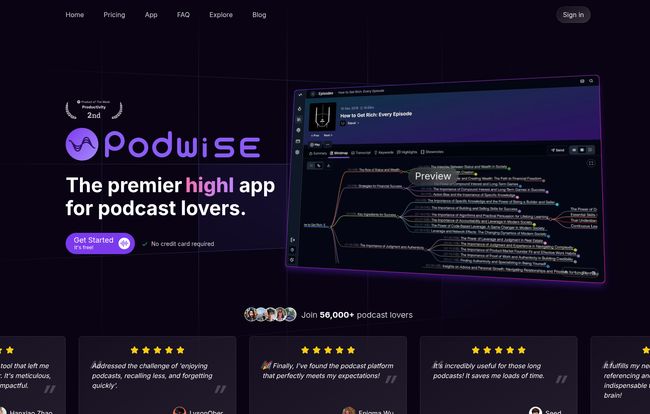
Visit Podwise
Building Your Second Brain with Seamless Integrations
Okay, this is where my inner productivity nerd gets really excited. Podwise integrates directly with the big players in the PKM (Personal Knowledge Management) space. We're talking:
- Notion
- Obsidian
- Readwise
- Logseq
This is huge. It means you’re not just passively consuming information; you're actively building a personal knowledge base. With a click, you can send your structured notes, summaries, and mindmaps directly into your 'second brain'. Imagine having detailed, searchable notes from every important podcast you've ever listened to, right inside your Notion database or Obsidian vault. It turns podcasts from a transient experience into a permanent, valuable asset. This, for me, is the primary reason to even consider a tool like this.
Deeper Interaction with AI Chat and Transcripts
Beyond summaries, Podwise also provides a full, accurate transcript of the episode. This is brilliant for searching for a specific term or pulling an exact quote. But they take it a step further with 'Ask Podwise AI'. You can literally chat with the podcast episode. For instance, you could ask, 'What were the main arguments against crypto mentioned in the episode?' and the AI will scan the content and give you a direct answer. It's a powerful way to interrogate the material and find exactly what you need without re-listening to the whole thing.
Let's Talk Money: The Podwise Pricing Breakdown
Alright, the inevitable question: what's this going to cost? Podwise has a pretty straightforward tiered system, which I appreciate. They offer a free plan that’s genuinely useful for testing the waters.
| Plan | Price | Who It's For |
|---|---|---|
| Free | Free | The curious listener. You get 4 AI-enhanced episodes a month and 3 AI questions per day. Perfect for seeing if it fits your workflow without any commitment. |
| Standard | $5.90/month (billed annually) | The serious learner. This unlocks the key stuff: integrations, running AI on 20 episodes/month, and 50 AI questions/day. If you use Notion or Obsidian, this is likely your sweet spot. |
| Pro | $11.90/month (billed annually) | The power user. For content creators, researchers, or absolute podcast junkies. You get a higher limit of 50 AI-processed episodes a month and unlimited questions. The upcoming 'upload audio files' feature also makes this tempting. |
In my opinion, the value here really depends on how much you value the knowledge from podcasts. If you save even one or two hours a month by getting straight to the point, the Standard plan pretty much pays for itself. The free plan is more than enough to decide if it's for you.
The Good and The Not-So-Good
No tool is perfect, right? After spending some time with it, here’s my honest take. The biggest pro is the sheer amount of time it saves. It's a genuine productivity multiplier. The ability to distill a 2-hour info-dump into a 5-minute read is its superpower. And the integrations, as I've said, are a massive win for anyone with a digital knowledge system.
On the flip side, the full power is locked behind a subscription. That's just the reality of SaaS tools, but it's something to consider. The limits on AI processing on the Standard plan (20 episodes/month) are generous for most, but could be a constraint for some super-users. Also, it’s important to state that this is a learning tool, not a replacement for your favorite podcast app for casual, entertaining listens. Trying to use it for your weekly comedy podcast might be overkill.
My Final Take: Is Podwise for You?
So, should you get Podwise? I'd say it's a resounding 'yes' if you fall into one of these camps:
- Lifelong Learners & Students: Anyone who uses podcasts as a primary source for learning will find this indispensable.
- Content Creators & Researchers: Need to pull quotes, facts, and ideas from podcasts for your own work? This will speed up your workflow immensely.
- Busy Professionals: If you're trying to stay on top of industry trends but are short on time, this is your shortcut.
- The PKM Community: If the words Notion, Obsidian, or 'Second Brain' mean anything to you, just go try the free plan. You'll probably love it.
If you just listen to podcasts to unwind during your commute, then you can probably stick with your current app. But if you've ever felt the frustration of 'so much to learn, so little time,' then Podwise is one of the most interesting and practical solutions I've seen in a long time.
Frequently Asked Questions about Podwise
Is Podwise actually free to start?
Yes, completely. The free plan lets you process 4 episodes a month and ask the AI 3 questions a day. No credit card is needed to sign up and give it a try.
What integrations does Podwise support?
It currently integrates with Notion, Readwise, Obsidian, and Logseq, allowing you to send your podcast notes directly to your preferred knowledge management tool.
Can I use Podwise on my phone?
Absolutely. They have a mobile-first design philosophy, with apps available for iOS and Android, plus a browser version that works well on mobile.
What if I need to process more podcasts than my plan allows?
On the Pro plan, you have the option to buy extra processing quota at a reduced rate, starting as low as $0.24 per extra quota.
Does it work with any podcast?
For the most part, yes. With the paid plans, you can bring your own private RSS feeds, which covers most podcasts, including many paid ones. You can subscribe to shows from major platforms like Apple Podcasts and Spotify.
Final Thoughts
Podwise isn't just another app; it’s a shift in how we can interact with audio content. It turns passive listening into an active learning process. In a world saturated with information, tools that help us filter, understand, and retain knowledge are more than just conveniences—they’re necessities. Podwise has certainly earned a permanent spot in my own digital toolkit.
